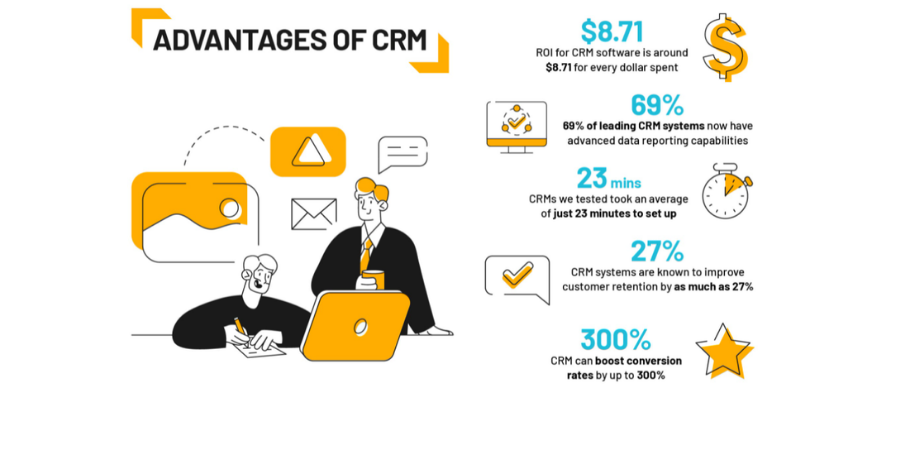How To Build A Custom CRM & What are Its Benefits?

CRM software is a centralized customer management system that stores and organizes the customer’s data so that businesses can better understand their customers’ needs and build strong customer relationships. CRM software enables enterprises to track customer interactions and categorize them based on their interaction or previous buying history. It helps them target potential customers and minimize the sales team’s efforts. However, different businesses have different products to deal with, and the approach might vary depending upon the customers.. Their preferences and product choice varies based on the quality, service, and product prices. It becomes necessary to mold CRM strategy based on customer preferences, and therefore, business owners sometimes need to use custom CRM software to respond profoundly to their requirements.
There are enormous benefits of customized CRM, from seamless scalability to increased customer retention but building custom CRM software requires a robust strategy and planned execution.
This article focuses on the key benefits of custom CRM software and tips for building custom CRM software.
Benefits of Custom CRM Software
- Integrate with company’s strategy: Custom CRM allows organizations to calibrate the CRM software that suits the company’s strategy and mission. It gives more control over the software and optimizes its usage.
- Niche functionality: Custom CRM software empowers business organizations to extend CRM capabilities by creating niche features. It helps them to respond better to customers’ needs and implement features that bring value to the business. It even provides opportunities to use the latest technology and differentiate their CRM strategy. With unique features, customized CRM software improves the customer retention rate and gives an edge over the competitors.
- Advanced data-analytics: Data analytics is an important feature of any software as it helps to check the performance of the business. With custom CRM software, users can decide on the analytics features and get detailed insights about the customers that are more meaningful to the business.
- Scalable: CRM software is scalable, and without losing productivity, business owners can add users. Since the custom CRM software is developed as per the business scope, it is easy to scale it.
- More customer traction: Custom CRM software can reduce sales and marketing efforts by enhancing the lead tracking and management process. Customized CRM solution allows them to apply rules that further fine-tune the sales funnel and improve the lead capturing process.
- Better ROI: The custom CRM software is configured with the intention to engage customers more and increase sales. It gives clarity on the CRM process and overall business opportunities. It means the company can gain more profit and higher ROI.
- Save costs on licensing fees and extra features: While using on-demand CRM software, organizations are liable to pay licensing fees for each user using it. But with custom CRM software, business owners do not have to worry about the licensing fees because it is scalable, and the company can add as many users as it wants. Besides that, custom CRM software can add advanced features without raising costs.
- Strong security: Security is always a concern when business enterprises decide to invest in CRM solutions. Usually, with traditional CRM software, business organizations need to rely on the software vendor’s security measures. However, with customized CRM software, organizations can incorporate an additional layer of security in the software or make changes to make it more hack-proof.
- Improve existing workflow: Ready-to-use CRM solutions are sometimes loaded with complicated features and require extensive training to help employees navigate through them. But with customized CRM applications, business owners can eliminate unnecessary features and simplify the workflow. It reduces the learning curve and facilitates a smooth transition of the software throughout the enterprise. Business organizations can even automate CRM processes that are not possible in the on-demand CRM software.
Tips For Building A Custom CRM
- Analyze business needs: Analyze business needs and identify the goal of custom CRM such as enhancing customer service, achieving transparency in the CRM process, increasing lead generation, automating workflow, etc. Prioritize CRM activity and ensure it falls under the organization’s budget, resources, and timeline. Also, decide the type of CRM required for the business – Operational CRM, Collaborative CRM, or Analytical CRM.
- Integration with other tools: Custom CRM software may need to integrate with third-party tools such as marketing automation tools, ERP tools, data-analytics tools, etc. For the smooth functioning of custom CRM, the organization must find out whether the custom CRM will support the third-party tool. Also, they should find out if the business infrastructure needs to change (change management) when integrated with third-party tools.
- Select the best partner for CRM customization: Many companies have in-house development teams, but it is not necessary that they are well-versed in CRM customization. In such cases finding the best partner for CRM customization is evident. While selecting the CRM partner ensures it has the necessary resources, skilled developers, industry experience, robust customer support, etc. On top of that, business owners should maintain continuous communication with the CRM partner to design and release CRM features phase-wise. Provide them with a detailed outline of the features and expectations from custom CRM software.
- Collect feedback: Building a custom CRM is one side; and the other side is its successful implementation. Once the custom CRM is deployed, collect the feedback from the users and see whether it helps in overcoming the business challenges. Provide training whenever it is needed.
Conclusion
Modern businesses are becoming more customer-centric, due to which there is an urge among business owners to reach potential customers and engage them at every touch-point of their life cycle. CRM solutions can turn out as a good investment, but they have to be strategic in their implementation. There are many CRM software available in the market, but no one size fits all. For leveraging maximum benefits from the CRM software, organizations can opt for customized CRM applications. Custom CRM software can fill the CRM strategy gaps and provide the flexibility to focus on features worth considering. A feature packed CRM tool can help nourish customer relationships and serve the ultimate goal of customer satisfaction.











